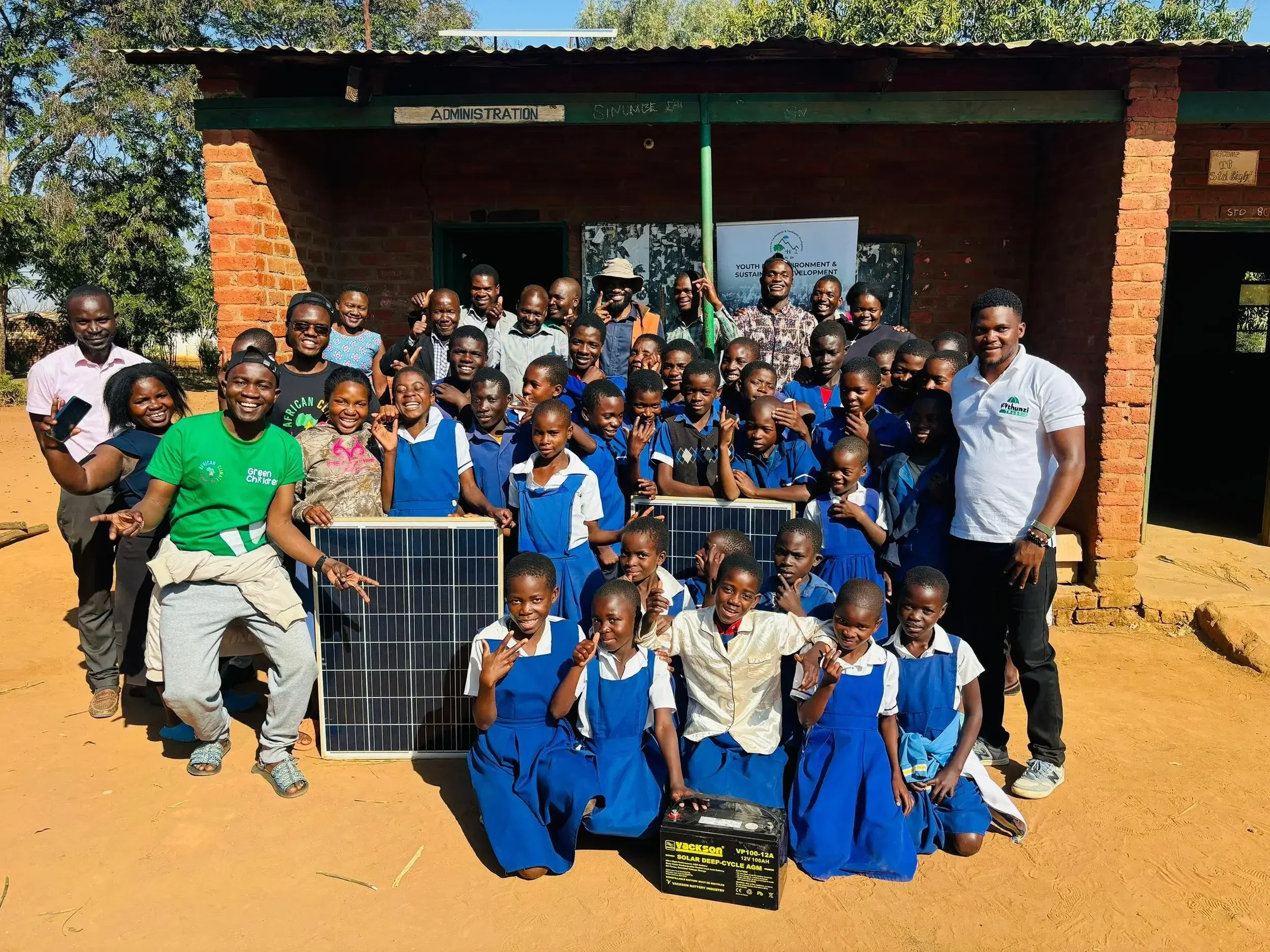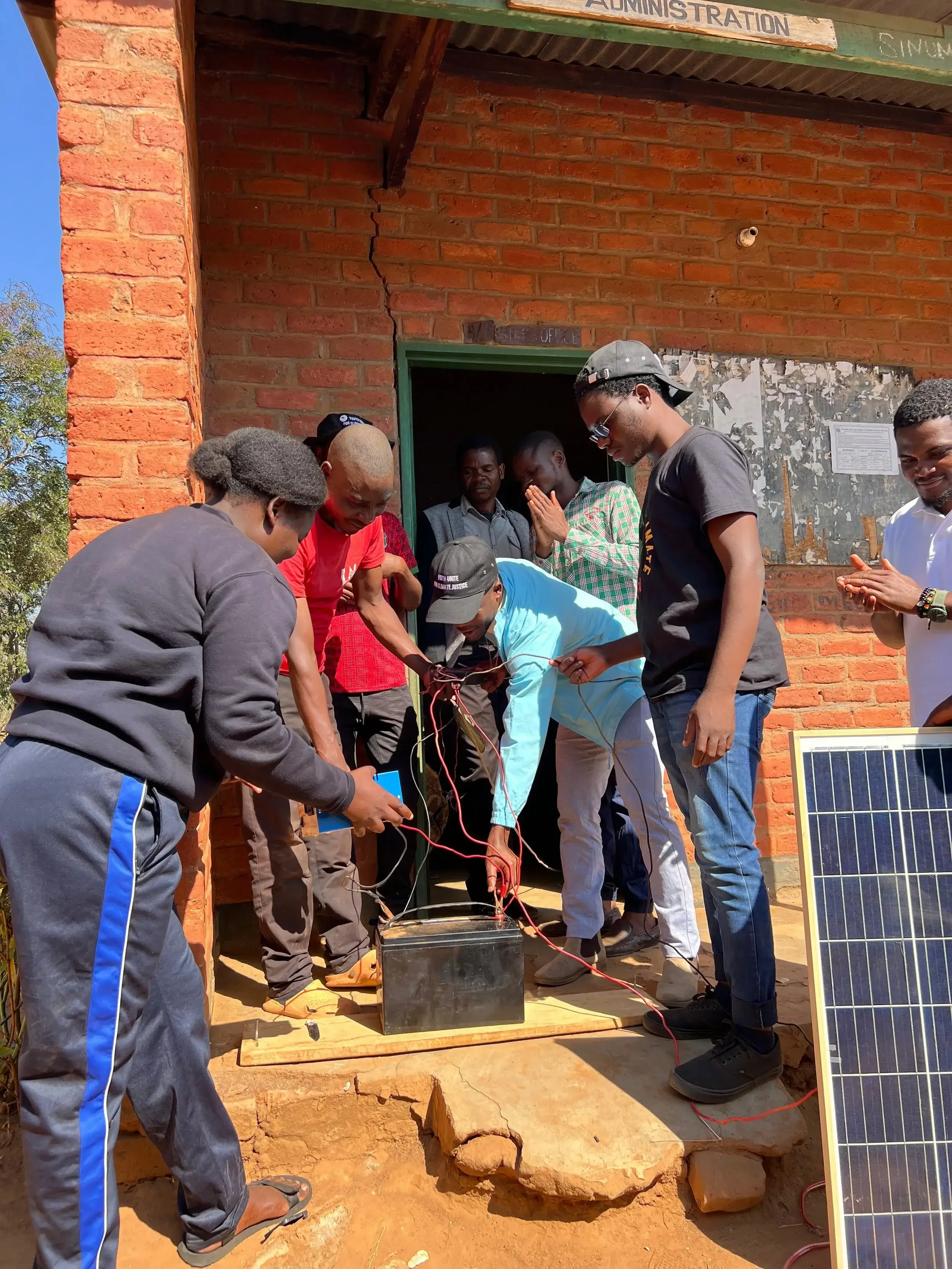This Is What a Just Energy Transition Looks Like in Practice
By Stella Hertantyo
The African Climate Alliance team and Ambassadors, in collaboration with Youth for Environment and Sustainable Development Malawi, install solar panels at a school outside of Lilongwe in June 2025.
The just energy transition isn’t only about moving away from fossil fuels. It’s also about ensuring that this shift creates a more equitable, accessible, and climate-resilient future — especially for communities who have long been excluded from energy systems.
At African Climate Alliance (ACA), advocating for a just transition is central to our work. This means ensuring that as we move toward renewable energy, we actively bridge the energy access gap and address the energy poverty that still defines life in many African countries.
We recently had the opportunity to put this commitment into practice.
In June 2025, while some of our team members were in Malawi to host a youth Solidarity Gathering on ‘Afrocentric Solutions for Sustainable Futures’ and meet with our local Ambassadors, we partnered with Youth for Environment and Sustainable Development (YSD) Malawi to install two solar panels at Sinumbe Primary School — a rural school located 1.5 hours outside of Lilongwe, including 30 minutes on a dirt road. Until this visit, the school had no access to on-grid electricity. A single solar panel powered only the principal’s office, which was used by students studying for their final primary school exams.
This new installation changes that. The solar panels will now power classrooms, giving students access to a more conducive learning environment and enabling them to study in the evenings as they prepare for exams. It’s a small but deeply meaningful step toward energy equity and educational opportunity.
“We wanted to showcase what it means to leave no one behind in the just transition,” says Aghmad Gamieldien, one of ACA’s team members who participated in the installation. “We went where the need was greatest, even if it was harder to reach.”
“We wanted to showcase what it means to leave no one behind in the just transition. We went where the need was greatest, even if it was harder to reach.”
The school is part of YSD Malawi’s Climate Resilient Model Schools initiative, which supports schools to become better prepared for climate impacts through activities like tree planting, waste management, organic gardening, and clean energy use. We met with the principal, teachers, and the students involved in the school’s sustainability club, who told us about their upcycling projects and other environmental efforts.
“The teachers are instilling a sense of stewardship in the students,” says Simeon Kalua, ACA Ambassador in Malawi. “This solar panel installation builds on that work and strengthens the school’s ability to be more resilient in the face of climate change.”
This visit reminded us that climate action doesn’t always look like protests or policy. It can also look like enabling students to participate in their own futures. Reliable electricity means improved study conditions, better grades, more career opportunities, and a brighter future. This is proof that climate action has positive social benefits too.
“Reliable electricity means improved study conditions, better grades, more career opportunities, and a brighter future. This is proof that climate action has positive social benefits too.”
“The solar panels will allow students to study more effectively. My biggest takeaway is how a small action like this can have such a big impact,” says Happy Mbewe, another ACA Ambassador in Malawi.
The installation followed ACA’s Solidarity Gathering in Lilongwe, which brought together young people from across Malawi to brainstorm practical ways to take local climate action. This project was one such outcome, showing how grassroots solutions, led by youth and rooted in community, are already shaping a more just and sustainable future.
As groundWork defines it, a just transition is “based on social dialogue between workers and their unions, employers, government and communities.” It’s about securing livelihoods, social protection, training opportunities, and a better future for all.
That future doesn’t begin with lofty promises. It begins with actions like this one, supporting a rural school in Malawi to become part of the renewable energy transition. Making sure no one is left behind.


